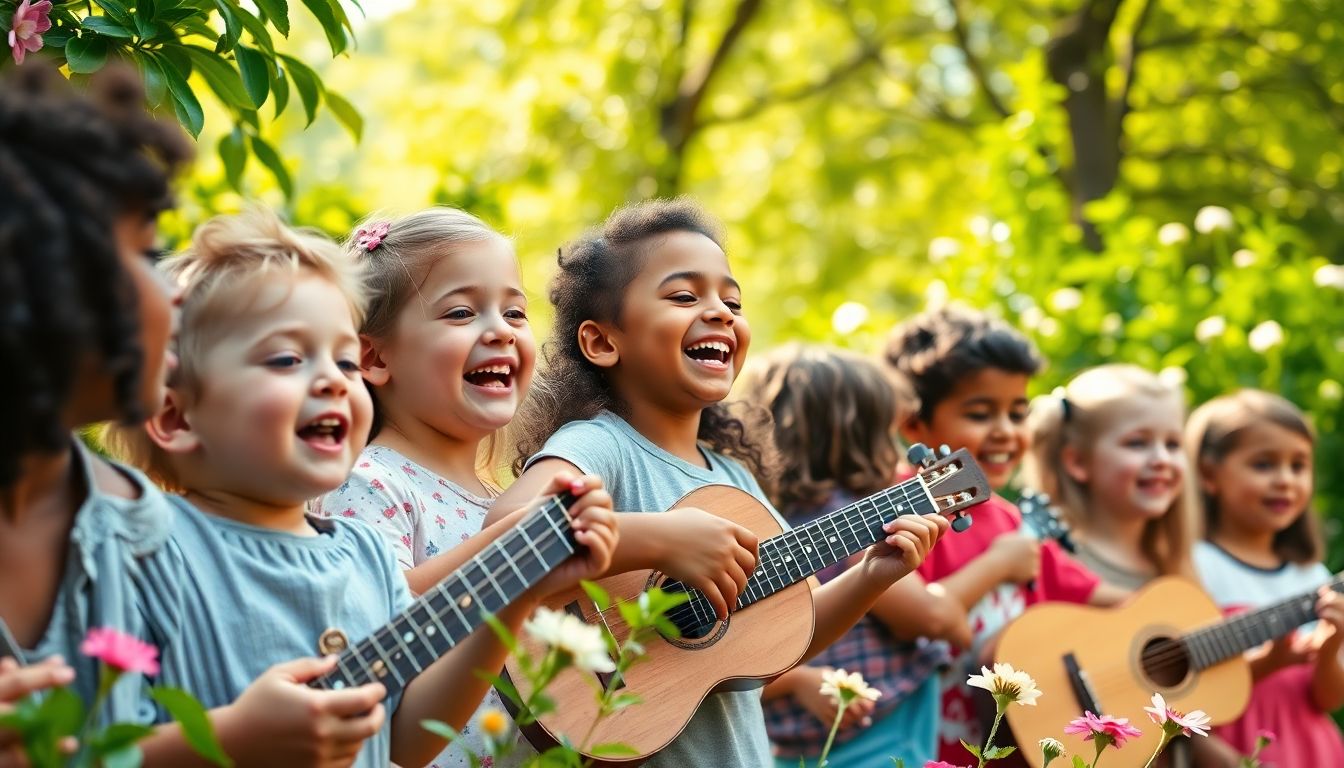
🔥 "Want the Full Guide? Grab Your FREE eBook Now!"
Sprout Symphony: Kids Who Bloom in Tune
Imagine a young girl, shy and withdrawn. She barely spoke. Then, she picked up a violin. Suddenly, her eyes sparkled. She found her voice through the strings. Music transformed her! Music education is not just about notes. It's about nurturing well-rounded kids. It helps them grow in amazing ways. This article explores the power of music. You'll discover how it shapes young minds. It can unlock their full potential.
The Melodic Mind: Cognitive Benefits of Music Education
Music does amazing things for a child's brain. Music training changes the brain! It builds better memory. Learning gets easier too. But how does music do this? Let's dive in.
Enhancing Memory and Cognitive Skills
Does music help kids remember things better? Studies suggest it does! Music boosts memory and sharpens focus. Problem-solving becomes easier with music. Learning an instrument improves attention span. It can even strengthen cognitive abilities. Music is like a workout for the brain.
Music as a Language: Strengthening Linguistic Skills
Music is another language. It can help kids learn new languages. Vocabulary grows through musical training. Reading skills get a boost. Music training can improve language acquisition. It enhances a child's overall communication abilities. What a bonus!
Boosting Mathematical Aptitude Through Rhythm and Structure
Music and math? They're connected! Rhythm involves patterns. Music uses fractions all the time. Spatial reasoning improves with music. Music helps kids understand structure. Math becomes easier to understand.
Emotional Resonance: Music's Impact on Social-Emotional Development
Music does more than make us smart. It helps kids understand emotions. It lets them express feelings. Music builds empathy. It fosters vital social skills.
Expressing Emotions Through Sound
Music allows you to express yourself. It gives kids a healthy outlet. They explore their feelings through sound. Music provides a unique form of communication. It helps kids understand their inner world.
Building Empathy and Understanding Through Collaborative Music Making
Group music activities are powerful. Choirs teach teamwork. Bands encourage cooperation. Kids learn to work together. They build empathy for one another. Collaborative music making makes friends.
Music Therapy: Addressing Emotional and Behavioral Challenges
Some kids face tough challenges. Music therapy can help. It eases stress. It reduces anxiety. Music soothes emotional difficulties. It helps with behavioral problems too.
Creative Crescendo: Fostering Creativity and Imagination Through Music
Music sparks creativity. It ignites imagination. It boosts self-expression. Music encourages kids to be unique. This is how music unleashes potential.
Improvisation and Composition: Unleashing Creative Potential
Improvisation means making it up as you go. Songwriting lets kids tell their stories. Music encourages outside-the-box thinking. Creative potential is unlocked. Each child finds their unique voice.
Exploring Different Genres and Cultures Through Music
Music comes in many styles. Different cultures offer different sounds. Kids broaden their horizons by listening. They learn about the world through music. Cultural awareness grows through musical exploration.
The Joy of Performance: Building Confidence and Self-Esteem
Performing music feels great. It builds confidence on stage. Self-esteem soars with every note. Kids shine when they share their music. Performance is a confidence booster.
Practical Harmonies: Integrating Music into Everyday Life
How can you bring music into your child's life? It is easier than you might think! Here are some simple ideas.
Creating a Musical Home Environment
Make music accessible at home. Play musical games with your family. Sing songs together. Attend concerts whenever you can. Create a playlist with your child.
Choosing the Right Musical Instrument or Program
Pick an instrument that excites your child. Consider their interests and abilities. Find a program that fits their learning style. Make sure it is fun and engaging.
Making Music Education Accessible to All Children
Music should be for everyone. Look for affordable programs. Seek out free resources. Support music in schools. Every child deserves a chance to learn.
Conclusion
Music benefits children in countless ways. It boosts their brains. It nurtures their emotions. It sparks their creativity. Music education helps kids grow. We must support music for all children. Let's empower them to "bloom in tune."

Comments